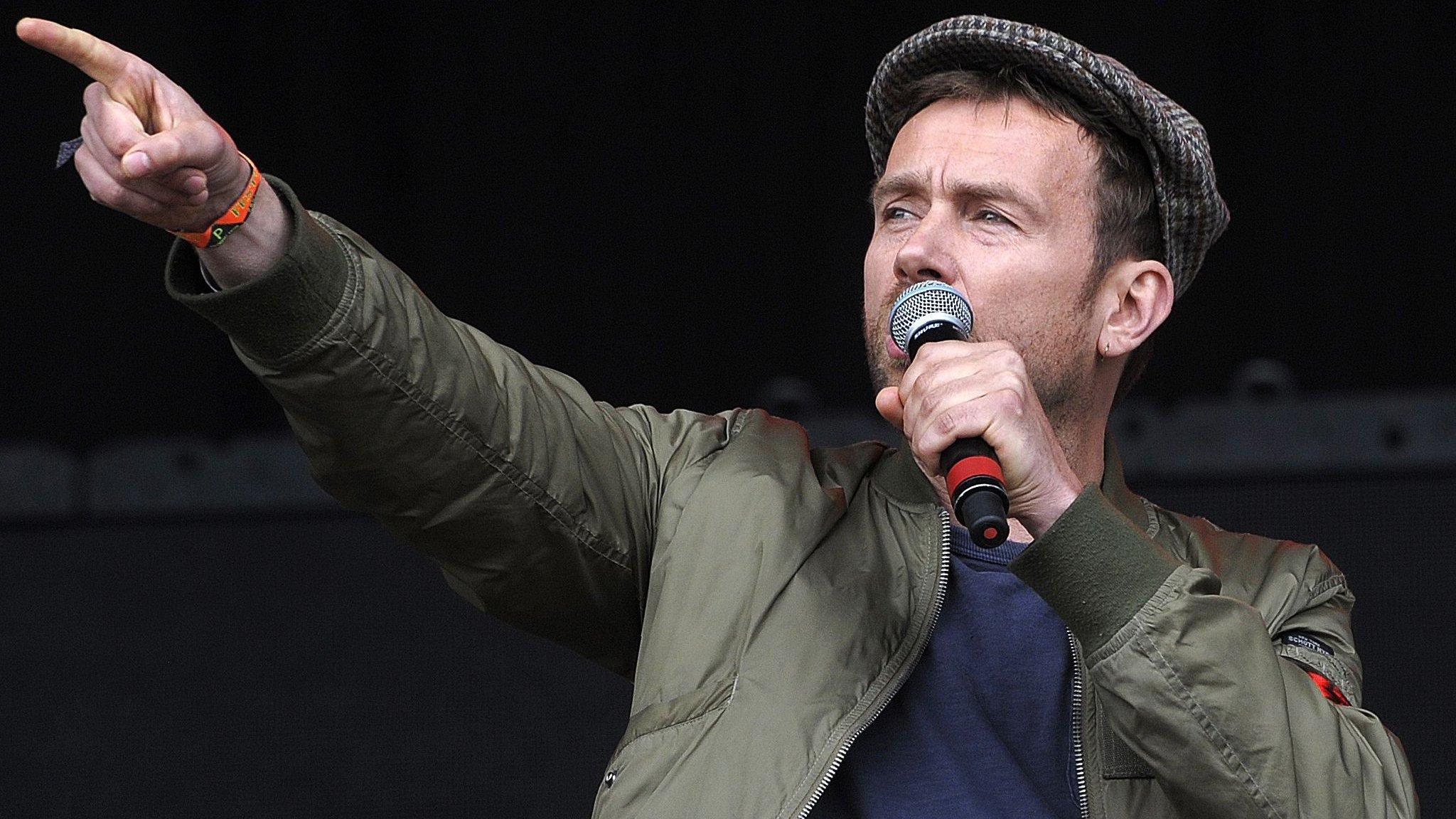Glastonbury's Grime take-over
- Published
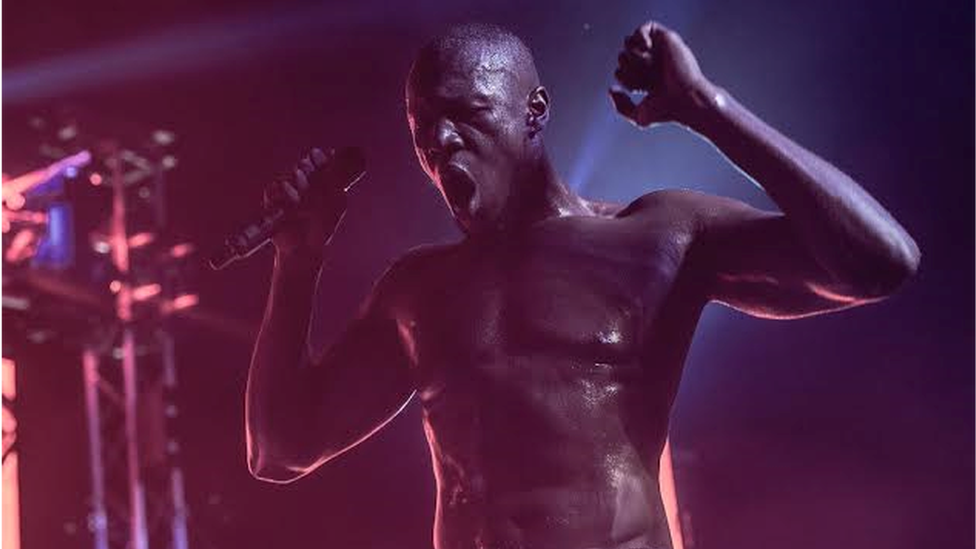
Rising star Stormzy was one of the highlights at Glastonbury's Sonic Stage
Glastonbury's Sonic Stage boasted an all-Grime line-up on Friday. The artists, performers and bookers explain what that means for UK hip-hop.
"South-east London. South-east London."
Not a chant you'd traditionally hear on a farm in rural Somerset, but that's the sound that rang out over Glastonbury on Friday, as the UK grime scene staged a day-long takeover of the Sonic Stage.
The line-up read like a who's who of UK hip-hop - Bugzy Malone, Section Boyz, Lady Leshurr, Stormzy, Kano. Even Skepta, who was performing on the Pyramid Stage, dropped in to guest during Novelist's set.
"Some of the artists that are gracing this stage today have shaped how grime looks for the next decade," says BBC Radio 1 Xtra's Charlie Sloth, who hosted the stage.
"We're at a point where, yo, the culture is huge."
This is the first time Grime has been given its own stage at Glastonbury, and it reflects a late resurgence for a genre many had consigned to the musical scrapyard.
Disillusioned
Grime emerged in 2002 as a darker, deconstructed version of garage.
Born in the bowels of Bow, East London, its beats can first be heard on tracks like Pulse X, by Musical Mob, and the hugely influential instrumental Eskimo by Wiley Kat - today known as the Godfather of Grime, Wiley.
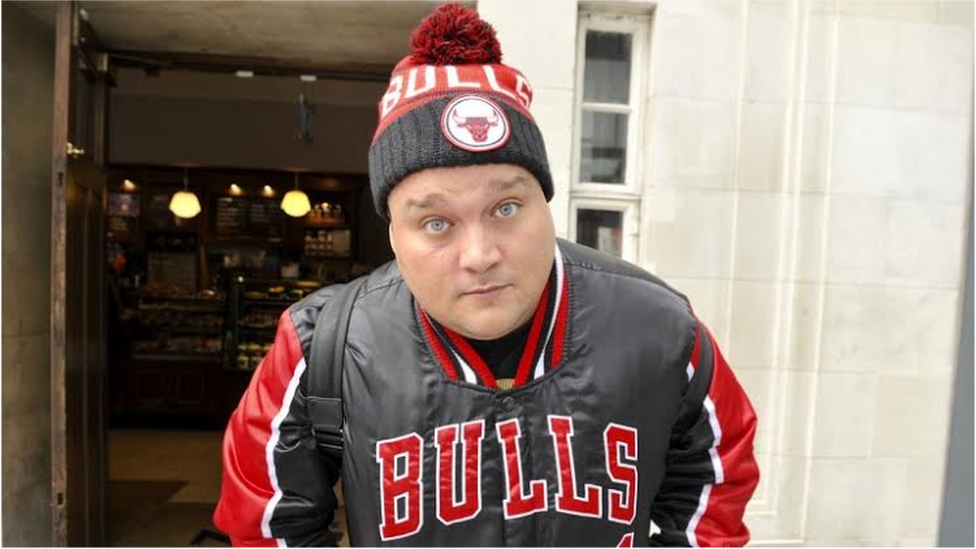
Charlie Sloth has championed Grime on his BBC Radio 1 Xtra show
Championed by pirate radio, the scene gripped East London. Tracks were traded and circulated by teenagers via bluetooth on mobile phones. Mixtapes and bootleg CDs were sold out of the back of cars.
Some saw it as a direct descendant of punk - a loud and splenetic reaction against the deprivation and disillusionment of its biggest proponents.
"Queen Elizabeth don't know me / So how can she control me / When I live street and she lives neat?" rapped Dizzee Rascal, the genre's biggest breakout star on Boy In Da Corner.
But Grime's moment of glory was short-lived.
The police associated it with violence and tried to shut down raves and club nights.
The controversial risk-assessment form 696 - used by the Metropolitan police when trouble was expected at a gig - was seen by many, including the then-head of UK Music Feargal Sharkey, to be an attempt at racial profiling.
But Grime had its own problems - poor infrastructure, a lack of unity, the decline of pirate radio.
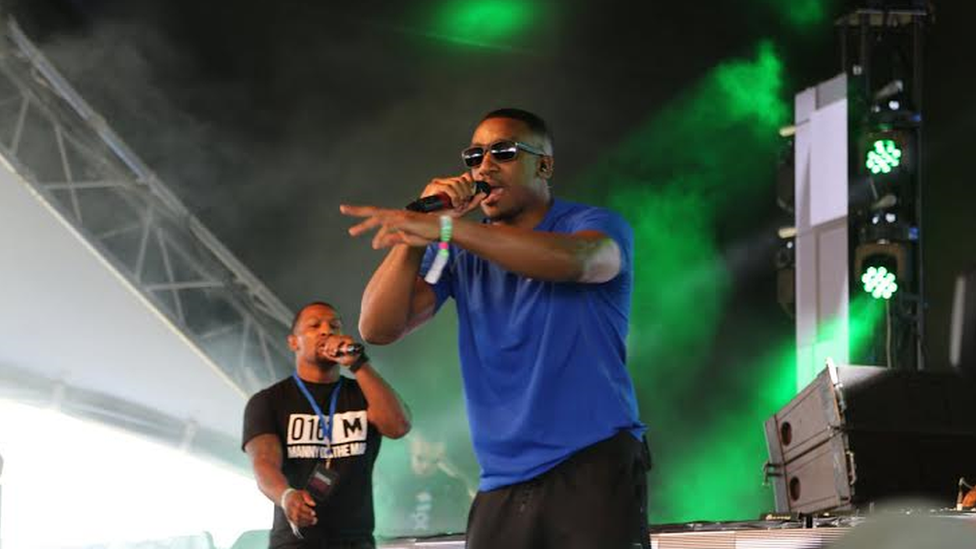
Like many Grime acts, Bugzy Malone has achieved success on his own merits - self-releasing his material and shunning media to communicate directly with fans on social networks
When artists like Tinchy Stryder, Wiley and Dizzee Rascal started making more commercial, chart-orientated tracks, it was deemed to be the final nail in the coffin.
"It's never gone away," says Sloth. "It's only in the last 18 months that the mainstream, and people outside the community, have started looking back in.
"A big part of the reason for that is ownership. The artists have finally realised that it's our way or no way at all. I feel that has given [Grime] the credibility and the platform to move things forward."
Which brings us back to Glastonbury, where Grime's tough beats and call-and-response hooks turn out to be a perfect match for the festival's ramshackle party atmosphere.
"Performing at Glastonbury has been like a little dream, you know what I mean?" says Sleekz from rap collective Section Boyz. "It's ticked off the list now."
"I watched it on TV when I was growing up. It's sick now to be performing here," adds his bandmate, Littlez.
The line-up was the brainchild of 19-year-old Maya Blue Gamble, whose family have been programming Glastonbury's dance arenas - collectively known as Silver Hayes, external - since their inception.
2016 was her first opportunity to book bands, and she jumped at the chance to highlight UK hip-hop.

Maya Blue Gamble - the Emily Eavis of the Silver Hayes arena?
"Grime is so hot right now," she says, with unbridled enthusiasm. "There's just something about the lyrics. They're quick and they're smart. I love the stories, man.
"Last year we had our urban day on the Sunday and it was a bit mix-and-match. We had Jess Glynne booked in there, then Novelist and then Fuse ODG. So it was a bit all over the place.
"I really wanted to keep it just Grime this year - have it really homegrown and really natural and celebrate what's going on in music right now."
The significance of this moment isn't lost on the performers.
"This is important," says Nadia Rose, a Croydon rapper who has just signed to Sony Music.
"This means we're in a good place. The pressure is on. Can UK hip-hop actually be the next thing?
"It's looked at as being a beg [wannabe] of US hip-hop, but it's not. It's our thing. That's the pressure but that's good. That's what we wanted, that's what we needed."
The person all the other acts look up to is Kano - a survivor of the original scene and Friday's headliner at the Sonic Stage.
His recent album, In The Manor, has signposted the future of the genre. As well as spitting over club beats (the tectonic bass of New Banger is a highlight of his set) the rapper takes a more introspective approach, reflecting on days gone by in East London.
He references street names and hairdressers, as well as his childhood touchstones - space invaders, super soakers and Wagon Wheels.
On the moving, poignant Little Sis, he reaches out an olive branch to a half-sister he met once as a teenager and subsequently forgot about.
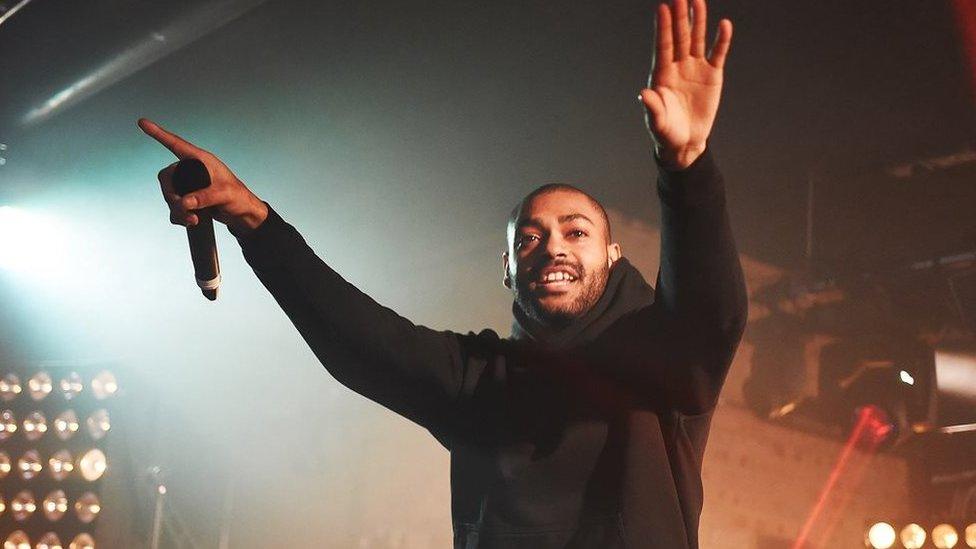
Kano: "You look at this line up and you feel like, 'wow, we really have arrived'."
"It's been a long time since we have received a body of work like Made In The Manor," says Sloth. "And some might say that this is the first body of work that will stand the test of time."
Kano agrees the genre needs to expand its horizons to thrive.
"We don't want to get into this area where we just release club tunes. Grime is just single-driven, like a lot of the industry is, and there's no real bodies of work out there.
"Yeah, it's good when you hear it in the club - but when you get in the car you put Nas on. Why? Because he has great albums.
"We need to make seminal albums. And the more albums like that we make, the longer we will be around for and the more respect we will gain internationally."
But while Kano is justifiably the headliner this year, there's a palpable sense the others are vying for his crown.
Bugzy Malone, whose self-released EPs have both charted in the top 10 of the UK albums chart; and Stormzy, whose dextrous invective has powered some of the year's most memorable tracks, are clearly taking notes.
The latter arrives at Glastonbury hours in advance of his set, and spends his time in the wings of the Sonic tent watching how the other acts go down. Every so often he retreats into his headphones, processing what he's seen.
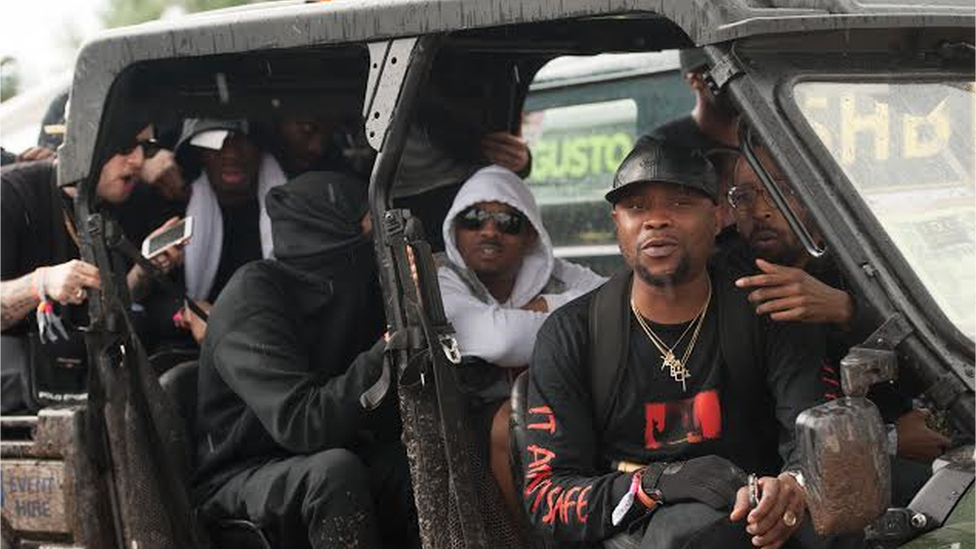
Skepta rushed from his set on the Pyramid Stage to check out the action at the Sonic tent
The tent is rammed as he takes the stage at 21:30 and the rapper does not disappoint, delivering a furiously energetic performance, punching the air, bouncing with the crowd and taking off his top for a sweat-slicked rendition of Shut Up.
At one point, he even offers to buy everyone in the crowd a drink.
Sloth, who has heard much of Stormzy's long-awaited, highly-anticipated debut album, says the Sonic Stage will soon be a distant memory for the Croydon-born rapper.
"He's about to take what we've created over the last decade to the next level," says the DJ.
"A lot of people don't see what's about to happen, because they're not immersed in the culture, but what Stormzy's about to do will live with us for the next 10 years at least."
And if that means the Sonic Stage will never see a line-up of this calibre again, Maya Blue Gamble isn't worried.
"We like to get the breaking artists and watch them grow into The Other Stage and into The Park Stage and into The Pyramid.
"That's exactly what we're about."

- Published25 June 2016
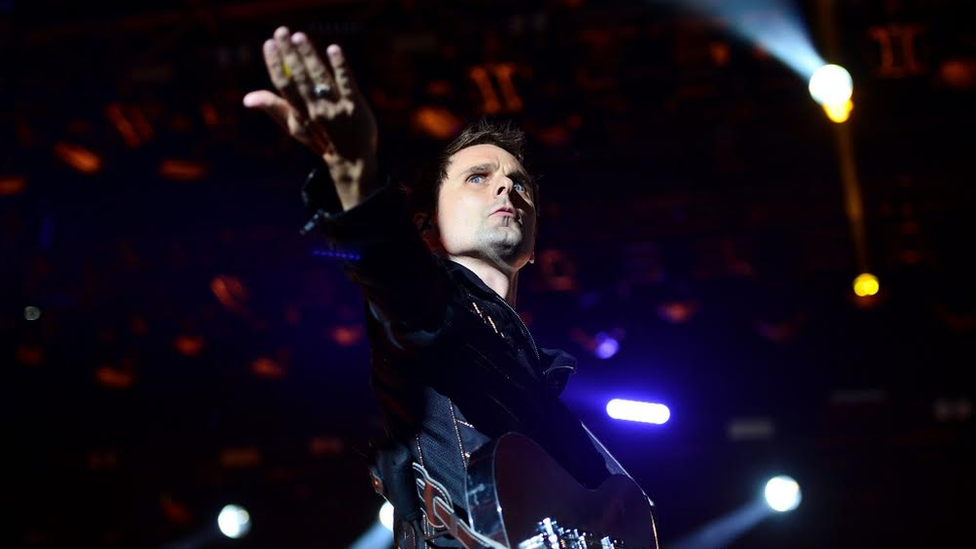
- Published22 June 2016

- Published24 June 2016
